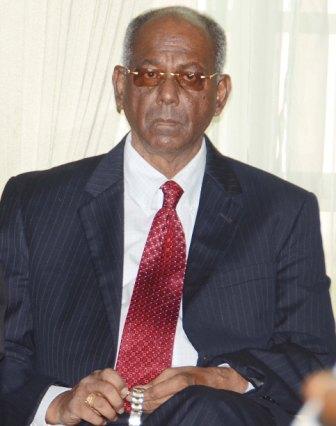Government’s fibre-optic cable deal with Dax Engineering should not have happened, former PPP stalwart Ralph Ramkarran said yesterday even as he warned that the action would result in a damaging competitive environment.
“This will clearly result in a destructive competitive environment with respect to a product which will be in oversupply as a result of this deliberate government action. It will result in an undermining of market forces and loss of confidence by the business community in the government’s bona fides with respect to creating fair conditions for creative competition to flourish,” Ramkarran wrote in his Sunday Stabroek column yesterday entitled `Axe the Dax’.
Amid growing concerns, Stabroek News reported last week that the botched Brazil to Georgetown fibre-optic cable that government boasted will be an integral part of its E-governance services will now effectively be handed over to a private contractor, Dax Engineering. Government recently revealed that an agreement had been reached with Dax Engineering on March 18, 2015, amid deep concerns over the flawed cable, on which it had already expended over $1 billion. Chief Executive Officer of Dax Engineering, Faisal Mohammed, subsequently told Stabroek News that the rehabilitation would cost “somewhere about US$10M.”
Head of the Presidential Secretariat Dr. Roger Luncheon told Stabroek News on April 26 that under the agreement for the repairs, Dax Engineering, will be given a number of pairs of fibres in that cable for its own use. The cable has 12 pairs of fibres. He said that the specific number of pairs that Dax would be given had not yet been finalized but said that experts had explained to the government that for its E-Governance project they would not utilize more than “one or two pairs for a long, long time to come.”

Yesterday, Ramkarran noted that the deal is far more generous than originally alluded to by Dr Luncheon. He pointed out that the contract provides for Dax to have use of the entire fibre optic cable, not pairs as said by Dr. Luncheon, as well as repeater stations, infrastructure, and equipment for 25 years, with an option for 15 more years, with enormous tax benefits, in return for repairing the cable. He recalled that even Digicel has not been promised such concessions despite an application made as soon as it opened business here several years ago, which has never been responded to.
“Contrary to what Dr. Luncheon said, Dax will be given licences to transmit and receive data and information. Extensive tax concessions will be provided,” Ramkarran wrote.
“While there is no constitutional or other legal objection, entering into important contractual obligations or arrangements by the Government after the announcement of elections, is prohibited by convention. The Government is fully aware of this but it is clearly unbothered by principles of transparent governance,” the former Speaker of the National Assembly declared.
Procurement
He said that the contract has all the hallmarks of criticisms made against government in relation to procurement and three issues stand out.
“The first is entering into a major contract so close to the elections. The second is that the terms appear to have been already negotiated and is a complete giveaway, contrary to Dr. Luncheon’s indication that the numbers of ‘pairs’ of cable that Dax would receive is still to be negotiated. The third is the failure of the Government to transparently advertise the project for bids,” Ramkarran said.
He noted that Luncheon “in his usual disingenuous” manner asked: ‘Why do you need to advertise a project which is free’ but Ramkarran emphasised that it is not free. “Dax’s has received remuneration in the form of enormous benefits which were negotiable. The project ought to have been advertised for bids and the most competitive bid accepted,” he declared.
He said that the persons who objected to this project in the first place, in the suspicion that it is being set up in competition to GT&T to benefit cronies, have finally been vindicated. The Government may claim that such was not the original intention but force of circumstances necessitated the privatization but this will clearly result in a destructive competitive environment with respect to a product which will be in oversupply as a result of this deliberate Government action, Ramkarran asserted.
He said that this episode can bring no comfort to those who have long been complaining about the lack of transparency in Government procurement. “At this election period, it brings into focus the question as to whether the Government has the commitment to tackle the burning issue of corruption which it has highlighted in its manifesto or whether, as many believe, it is just fat talk. Its promise to the electorate would be inevitably viewed against the background of this contract with Dax,” he declared.
The former Speaker pointed out that while simultaneously making a promise to deal with corruption, the Government proceeds in the same old way, in secret, with no transparency, to award a contract, eminently suitable for competitive bidding, which has implications for an entire industry, and negative consequences for the largest important company active in that industry.
The other companies which have been granted permission to lay fibre optic cables have also been undermined by this act, he added.
Earlier, Ramkarran had noted that this particular project was enmeshed in controversy from the time it was unveiled. Dubbed the E-Governance Project, its announced objective was to provide Government agencies with the capacity to develop ICT capability. Having regard to the GT&T fibre optic cable, which had the capacity to satisfy all of Guyana’s needs, the Government was accused of undermining GT&T from which it could have purchased ICT capacity and which would have been far more cost effective. It was also accused of intending to privatize the use of the fibre optic cable to its cronies after it had been installed. The government denied these accusations. Nevertheless, suspicions remained and continued to be voiced, Ramkarran noted.
He recalled that the E-Governance Project has experienced tremendous difficulties on account of the delays and the fact that the cable was improperly laid. Ramkarran said that he was told about a year and a half ago that the cable was not being laid at a sufficient depth and that it would eventually be exposed as a result of soil erosion, which appears to have eventually occurred.
He said that shooting itself in the foot has become an occupational hazard for the PPP and its governments.
The agreement has been criticized by the Working People’s Alliance (WPA) which accused government of consigning control for free of all of the assets of the project and a 40-year monopoly licence to a “nothing company.”
The WPA believes that the contract is a “gift” to Dax and says it’s a small company with capitalization of $7,000 and called the 40-year contract an outrage, urging it be cancelled immediately. The party says that assets acquired, with the monies spent thus far on the project by government, such as radio equipment, antennae and equipment to set up towers and communication posts across the country, had not been valued before the transfer of the project to Dax. As such there is no way to know, in dollar figure amounts, how much Dax is really getting out of the project.
Recently too, Chief Executive Officer of the local company, Brain Street, Lance Hinds, told Stabroek Business that concerns had also been raised about the Memorandum of Understanding between the government and Dax Engineering regarding the use of the e-governance cable being installed by government.
“It is felt that the cable would have been viewed by the commercial telecommunications sector as a public good because it was intended to provide e-government and related services to Guyanese citizens. The question therefore is how does Dax Engineering intend to use its share of the bandwidth? Is it going to be for commercial use?” Hinds, who is also President of the Georgetown Chamber of Commerce and Industry, queried.








